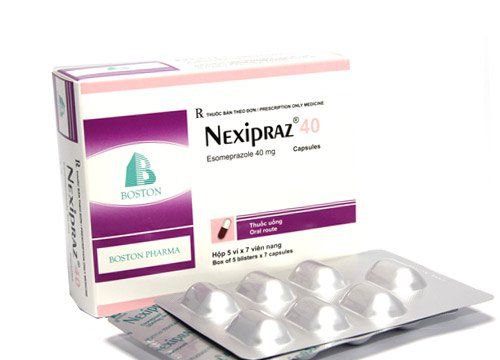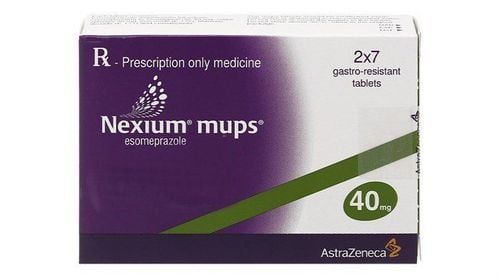This is an automatically translated article.
PPI stands for proton pump inhibitor which is a proton pump inhibitor. Proton inhibitors (PPIs) are widely used in the treatment of symptoms caused by increased gastric acid secretion such as acid reflux, heartburn. PPI drugs are indicated for the treatment of diseases such as: gastric - duodenal ulcers, gastroesophageal reflux disease, ...
1. What is a PPI?
PPI stands for proton pump inhibitor. Proton inhibitors (PPIs) are widely used in the treatment of symptoms caused by increased gastric acid secretion such as acid reflux, heartburn.
Currently on the market there are many different types of proton inhibitors such as:
Omeprazol Lansoprazol Pantoprazol Dexlansoprazole Esomeprazole, ... Although there are many different types of proton pump inhibitors, they all have similar efficacy. Dosage forms of proton pump inhibitors such as tablets, capsules, intravenous drugs.
2. The effect of proton pump inhibitors
Proton inhibitors help reduce stomach acid levels because they work by inhibiting the number of acid-forming receptors in the stomach lining. Proton pump inhibitors are specifically indicated in the following cases:
Used in the treatment of gastric - duodenal ulcers Used to prevent gastric - duodenal ulcers caused by the use of non-steroidal anti-inflammatory drugs Hernia Diaphragm Combined with antibiotics in the treatment of peptic ulcers infected with Helicobacter pylori Treatment of gastroesophageal reflux disease (GORD) Treatment of Zollinger - Ellison syndrome In addition, proton pump inhibitors are also indicated in some patients. other cases when prescribed by a doctor.
3. Usage and dosage of proton pump inhibitors
Before starting PPIs, it is necessary to discuss with the patient about the course of treatment and consider the risk factors associated with stomach cancer because the use of PPIs can reduce or mask the symptoms. symptoms of stomach cancer.
Most PPIs come in at least two dosage regimens, standard and low-dose. Some proton pump inhibitors have additional dosing regimens.
Dosage of PPIs in the treatment of gastroesophageal reflux disease - oesophagitis Use standard dose of PP I daily for 4-8 weeks. The dose may be doubled if the disease does not improve despite the standard dose being used for the appropriate duration of treatment. If symptoms subside and are well controlled after 4-8 weeks, the dose can be gradually reduced, used as needed, or discontinued.
When treating patients with mild gastroesophageal reflux disease, it is necessary to agree between the patient and the physician that treatment will be periodically evaluated, with the goal of controlling symptoms by changing lifestyle changes and minimal dependence on medications.
Dosage of PPIs in the prevention of gastric ulcers caused by the use of non-steroidal anti-inflammatory drugs Use standard doses of PPIs daily for 8-12 weeks to heal ulcers. If possible, the use of non-steroidal anti-inflammatory drugs should be stopped and replaced with other drugs. For ulcer prophylaxis, the recommended dose is omeprazole 20 mg once daily during NSAID use. Treatment of peptic ulcer disease is associated with the use of NSAIDs. The recommended dose is omeprazole 20 mg once daily for 4 weeks, which may be prolonged if the physician considers it necessary for treatment. If the patient is intolerant to omeprazole, pantoprazole can be used instead. Lansoprazole should not be used for ulcer prophylaxis in patients receiving non-steroidal anti-inflammatory drugs but may be used to treat ulcers.
Indications for the use of PPIs to prevent gastrointestinal ulcers caused by non-steroidal anti-inflammatory drugs in patients at specific risk as follows:
- Age: over 65 years old
- History of peptic ulcer
- Currently Daily use of non-steroidal anti-inflammatory drugs
- Patients with a history of cardiovascular diseases
- Are using anticoagulants, aspirin, corticosteroids.
Dosage of PPIs in the treatment of gastric ulcers caused by Helicobacter pylori Using proton pump inhibitors according to the treatment regimen. To kill H.pylori, use standard dose PPI twice a day in combination with antibiotics amoxicillin and clarithromycin in a course of 7 days. Continue using proton pump inhibitors in patients with large ulcers. Discontinue use when treatment results are negative for H.pylori.
How is the route of administration and how to use proton pump inhibitors? For tablets and capsules: Patients use proton pump inhibitors before meals. Stomach acid helps to release the ingredients of the medicine that help the medicine to stop the symptoms.
For powdered medicine: The patient mixes it with water to drink before meals.
For drugs in the form of intravenous infusion: Use according to the doctor's prescription.
4. Side effects of proton pump inhibitors
Proton pump inhibitors can cause many unwanted effects for users. The following are the side effects of proton pump inhibitors:
Headache, drowsiness, dry mouth, dizziness, rash, itching. Increased risk of infections such as: community-acquired pneumonia, hospital-acquired pneumonia, gastrointestinal inflammation, pseudomembranous colitis, increased Candida infections, ... Poor absorption of nutrients Hypocalcemia, increased risk of thinning bones, increasing the risk of fractures. Severe hypomagnesemia, hyponatremia Acute interstitial nephritis Leukopenia, thrombocytopenia. Jaundice or non-jaundice hepatitis caused by the use of omeprazole temporarily increases transaminases. Lupus erythematosus due to PPI
5. PPI . drug interactions
Some drugs and foods can cause interactions when used with PPIs.
Proton pump inhibitors can interact with the following drugs including:
Patients with a history of alcoholism if used with proton pump inhibitors increases the risk of hypomagnesemia. Concomitant use of PPIs with diuretics, cyclosporin or aminoglycoside antibiotics increases the risk of hypomagnesemia. Slight increase in anticoagulant effect of Warfarin when used concomitantly with proton pump inhibitors. Clopidogrel drug.
6. Precautions when using proton pump inhibitors (PPIs)
Review the patient's long-term PPI use, considering whether to continue or reduce the PPI dose. Discuss and advise patients about the risk of reversible increased acid secretion that may occur after stopping the use of proton pump inhibitors. Use PPI in the shortest time to be effective. Store proton pump inhibitors at room temperature, in a cool, dry place, away from light and the reach of children.
Please dial HOTLINE for more information or register for an appointment HERE. Download MyVinmec app to make appointments faster and to manage your bookings easily.













